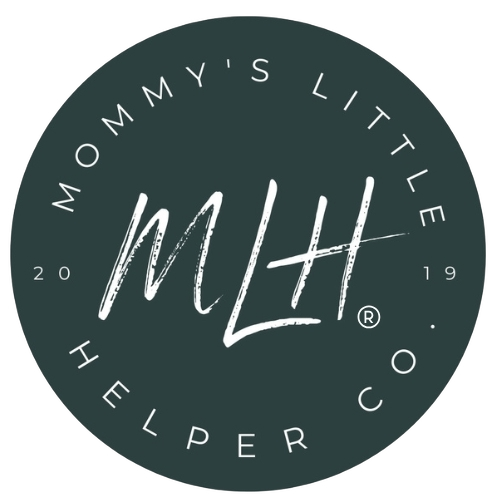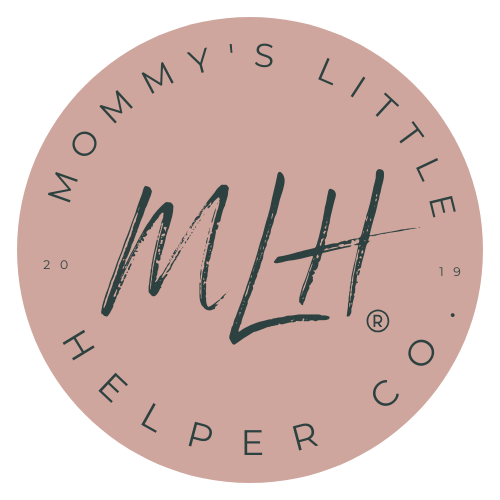
Signs You Might Be a Helicopter Parent (And How to Let Go)
If you’ve ever hovered over your toddler as they tried to climb onto a chair, cleaned up their spills before they could even notice, or found yourself narrating every move they make to “help” them succeed, mama, you’re not alone. We’ve all had moments like these. As a mom of three and the founder of Mommy’s Little Helper, I’ve been there too, especially with my first. The worry. The over-correcting. The feeling that only I could do things right for my baby.
But here's the thing: while that intense love and protectiveness comes from a good place, sometimes it sneaks into helicopter parenting territory. And that can hold our little ones back from building confidence and independence.
So let’s talk about the signs, the “why” behind it, and gentle ways to let go—without guilt.
What Is Helicopter Parenting?
The term "helicopter parent" describes moms or dads who tend to hover, swoop in, and micromanage their children’s experiences. Think of it as doing things for them rather than with them.
As Canadians, we value kindness, safety, and doing our best, but sometimes our best means stepping back instead of stepping in.
5 Signs You Might Be a Helicopter Parent
1. You Often Finish Tasks for Your Child
If your toddler is trying to put on their shoes or clean up their toys, and you rush in to do it faster or "the right way," it could be a sign you’re stepping in too soon. Kids learn best by trying even if they fumble.
2. You Worry Constantly About Safety
Of course, safety is a top priority. But if you’re saying “be careful” every five seconds, or stopping your child from climbing, pouring, or exploring, especially in spaces like the kitchen, it might be more about your anxiety than their actual risk.
3. You Solve Problems Before They Try
It’s hard to watch our kids struggle, even a little. But if you find yourself opening snack containers, picking up puzzles, or fixing every obstacle before they even try, you may be unintentionally sending the message that they can’t do things themselves.
4. You Control Their Schedule Too Tightly
Are you filling every hour with structured activities, or guiding playtime so much that there’s little room for creativity? Free play is key to healthy development—and it’s okay if things get a little messy or slow.
5. You’re Anxious About What Other Parents Think
We’ve all felt the pressure to be the “perfect parent.” But if you’re making decisions based more on how things look than what feels right for your child, it’s worth stepping back and checking in with yourself.
Why We Hover (And Why It’s Okay That We Do)
Let’s be real: parenting is hard. Especially for first-time moms and dads who are bombarded with information, expectations, and picture-perfect parenting on Instagram.
Wanting your child to be safe, happy, and successful is not wrong. It means you care deeply. It’s just that sometimes, the best way to help is to allow space for mistakes.
How to Start Letting Go (Gently)
Letting go doesn’t mean letting your child run wild. It means creating safe, age-appropriate opportunities for independence. Here are a few tips that have helped me and many families I work with:
1. Set Up Safe Spaces for Exploration
Instead of constantly saying "no," create “yes” zones in your home. A kitchen tower, for example, allows your child to join you at counter height safely—no more wobbly chairs. Let them wash veggies, mix batter, or rinse dishes. It’s empowering, engaging, and safe.
2. Use Montessori Furniture for Independent Play
Montessori furniture is all about child-led learning. Items like toddler-sized tables, open shelving, and climbing structures give kids the tools to explore, create, and discover at their own pace, without adult intervention.
3. Pause Before Jumping In
Next time you see your toddler struggling with something, pause. Count to ten. Watch what they do. You might be surprised at how resourceful they can be when given a little space.
4. Let Them Make (Small) Mistakes
Spilled milk? Let them help clean it up. Socks on backwards? Totally fine. These little hiccups are how they learn. The more they try, the more capable they feel.
5. Talk About Feelings (Yours and Theirs)
It’s okay to say, “Mommy gets nervous sometimes when you climb.” Talking about your feelings (without guilt-tripping) teaches them emotional intelligence and shows them that feelings don’t have to stop us from trying.
Final Thoughts: You’re Already Doing Great
Parenting isn’t about perfection. It’s about connection. It’s about slowly letting go, one little step at a time, so our children can become confident, curious, and resilient humans.
As a mom and the founder of Mommy’s Little Helper Co., I created our line of Montessori furniture, from kitchen towers to play furniture, because I believe our kids deserve tools that help them thrive. And us parents? We deserve peace of mind.
So if you’re looking for practical ways to give your child more independence, without compromising on safety, explore our collection today at Mommy’s Little Helper Co.




